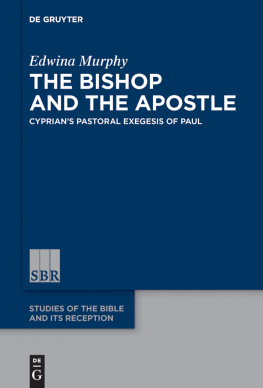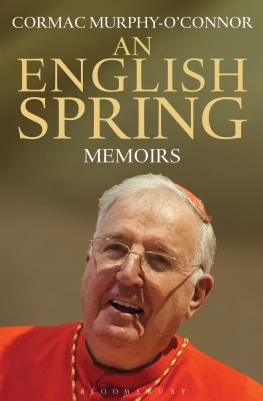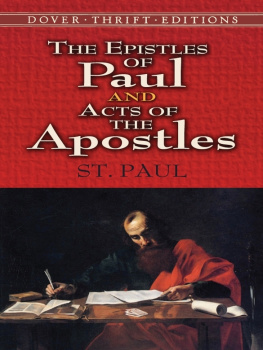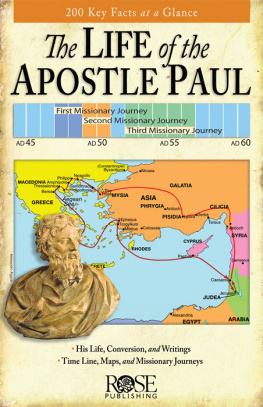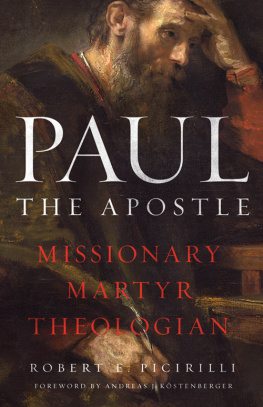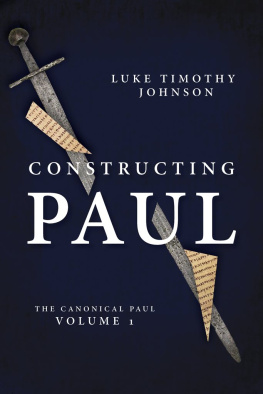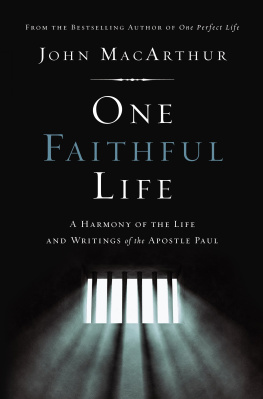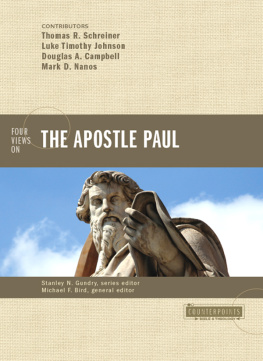Paul
Jerome Murphy-OConnor is Professor of New Testament at the Ecole Biblique et Archologique Franaise, Jerusalem.

The Kachere Tree Body of Christ (Photo: MISSIO, Munich)
The Kachere Tree is propagated by birds who deposit the pits of its fruit on the branches of other trees. Airborne roots float down and take root in the soil. As the Kachere tree grows it incorporates and changes its host. Malawian sculptors from the Kungoni Art Centre in Mua saw this descent and transformation as a profound symbol of Gods grace. From a towering Kachere tree they created this 3m high figure in order to concretize Pauls vision of the Body of Christ. The torso and limbs are made up of tiny carvings of those who have been transformed through incorporation into the Christian community. Together they are the fruit-bearing physical presence of Christ in the world.
Paul
A Critical Life
Jerome Murphy-OConnor, OP


Great Clarendon Street, Oxford OX2 6DP
Oxford University Press is a department of the University of Oxford.
It furthers the Universitys objective of excellence in research, scholarship,
and education by publishing worldwide in
Oxford New York
Athens Auckland Bangkok Bogot Buenos Aires Calcutta
Cape Town Chennai Dares Salaam Delhi Florence Hong Kong Istanbul
Karachi Kuala Lumpur Madrid Melbourne Mexico City Mumbai
Nairobi Paris Sao Paulo Singapore Taipei Tokyo Toronto Warsaw
with associated companies in Berlin Ibadan
Oxford is a registered trade mark of Oxford University Press
in the UK and in certain other countries
Jerome Murphy-OConnor OP, 1996
First published 1996
First issued as an Oxford University Press paperback 1997
All rights reserved. No part of this publication may be reproduced,
stored in a retrieval system, or transmitted, in any form or by any means,
without the prior permission in writing of Oxford University Press,
or as expressly permitted by law, or under terms agreed with the appropriate
reprographics rights organization. Enquiries concerning reproduction
outside the scope of the above should be sent to the Rights Department,
Oxford University Press, at the address above
You must not circulate this book in any other binding or cover
and you must impose this same condition on any acquirer
British Library Cataloguing in Publication Data
Data available
Library of Congress Cataloging in Publication Data
Paul: a critical life / Jerome Murphy-OConnor.
Includes bibliographical references and index.
1. Paul, the Apostle, Saint. 2. Christian saintsTurkey
TarsusBiography. 3. ApostlesBiography. I. Title.
BS2506.M855 1996 225.92dc20 [B] 9549173
ISBN 0192853422
3 5 7 9 10 8 6 4
Printed and bound in Great Britain by
Mackays of Chatham PLC, Chatham, Kent
Preface
NOT the least of problems faced by the author of a biography of the Apostle, Paul of Tarsus, is to find a title that will distinguish it from its many eminent predecessors. My choice of Paul: A Critical Life was dictated by the polyvalence of the adjective, whose range of meanings may serve both to explain my purpose and to highlight the specific contributions of this volume.
One sense of critical is involving suspense as to the issue, but it can also mean decisive, crucial. Both are applicable to Paul, and to my own life in relation to his. The church of Antioch was responsible for the missionary outreach, which demanded of pagan converts only faith in Jesus. It was in this spirit of freedom that Paul laboured in Asia Minor and Greece. When Antioch later changed its stance and aligned itself with Jerusalem, which insisted on observance of the Law, the status of its churches to the north and west came under attack. The very nature of Gentile Christianity was put at risk. Paul was its main defender. For five or six years in the middle of the first century AD he invested every ounce of his energy, and every scintilla of his intelligence, in devising a response which was ultimately to prevail. Even if his writings were not part of the canon, the incalculable debt we owe him is adequate justification for yet another attempt to understand how and why he achieved what he did.
On a more personal level, I wrote my doctoral dissertation at the University of Fribourg, Switzerland, on Pauls understanding of the function of preaching, and it was to prove crucial to my future career. Not only did it lead to my nomination to the cole Biblique in 1965, which has been my academic home ever since, but it stimulated a life-time interest in the Pauline writings. At first my concern was with the exact interpretation of points of detail, with a view to a better understanding of his theology, but almost insensibly my focus gradually shifted to the historical dimension of his life and work. The more conscious I became of the way theological thought actually developsby historically conditioned insights rather than by logical deduction from a deposit of faiththe more I wanted to encounter the personality behind the letters, and to determine the factors which led him to think in a particular way. This book contains the fruits of that quest, which are displayed with a certitude that all historians will recognize as spurious. Only definiteness, however, can provoke the reactions that in dialogue lead to progress. I make my own what J. A. T. Robinson said in the conclusion to a much more challenging work, all the statements of this book should be taken as questions (1976: 357).
I try to be as critical as possible in the sense of exercising careful judgement, above all with respect to the use of material from the Acts of the Apostles. The tradition of lives of Paul has been to accept the framework provided by Luke, and into it to integrate material from the letters. The appropriateness of this approach, which subordinated the testimony of the individual concerned to that of a tendentious theologian, was questioned by J. Knox, who, in consequence, laid down the methodological principle, A fact only suggested in the letters has a status which even the most unequivocal statement of Acts, if not otherwise supported, cannot confer. We may, with proper caution, use Acts to supplement the autobiographical data of the letters, but never to correct them (1950: 32). Recent lives of Paul (e.g. Fitzmyer, Baslez, Lgasse) all pay lip-service to this principle, but in practice they not only permit Luke to exercise decisive control over the presentation of Pauls career, but fail to recognize the problems of extracting historical data from the Acts of the Apostles. The sporadic criticisms of Lukes portrait of Paul, which are scattered through many commentaries on Acts, has been recently competently synthesized by J. C. Lentz, Jr., in his Lukes Portrait of Paul (1993).
I may have gone to the other extreme in the way I use the letters as the principal source of Pauls biography, but the publications of three of my colleagues have made it impossible for me to continue to read the Acts of the Apostles with the navety that characterized some of my earlier work. Advances in textual criticism mean that it is no longer acceptable to move without comment or justification from the Western text to the Alexandrian text and back again. Moreover, in their present form both are corrupt. To date the only fully documented critical text is that provided by M.-E. Boismard and A. Lamouille in their monumental
Next page

